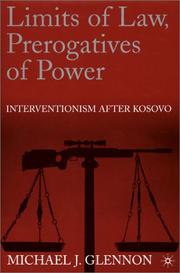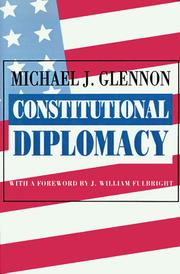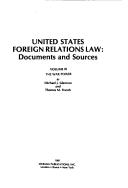| Listing 1 - 10 of 18 | << page >> |
Sort by
|
Book
ISBN: 9780804771757 Year: 2010 Publisher: Washington, D.C. Woodrow Wilson Center
Abstract | Keywords | Export | Availability | Bookmark
 Loading...
Loading...Choose an application
- Reference Manager
- EndNote
- RefWorks (Direct export to RefWorks)
International relations. Foreign policy --- International law --- Security, International --- Nuclear nonproliferation --- Aggression (International law) --- Droit international --- Sécurité internationale --- Non-prolifération nucléaire --- Agression (Droit international) --- Sécurité internationale --- Non-prolifération nucléaire

ISBN: 0312239017 9780312239015 Year: 2001 Publisher: Basingstoke: Palgrave,
Abstract | Keywords | Export | Availability | Bookmark
 Loading...
Loading...Choose an application
- Reference Manager
- EndNote
- RefWorks (Direct export to RefWorks)
Book
ISBN: 0190206470 9780190206451 0190206454 9780190206475 9780190206444 0190206446 0190206462 Year: 2014 Publisher: New York : Oxford University Press,
Abstract | Keywords | Export | Availability | Bookmark
 Loading...
Loading...Choose an application
- Reference Manager
- EndNote
- RefWorks (Direct export to RefWorks)
Why has U.S. national security policy scarcely changed from the Bush to the Obama administration? And why does it matter? The theory of 'double government' posed by the 19th century English scholar Walter Bagehot suggests a disquieting answer. The public is encouraged to believe that the presidency, Congress, and the courts make security policy. That belief sustains these institutions' legitimacy. Yet their authority is largely illusory. National security policy is made, instead, by a 'Trumanite network' of several hundred members that is largely concealed from public view.
National security --- Legislative oversight --- Judicial review --- Government accountability --- Management. --- Decision making. --- Accountability in government --- Public administration --- Responsibility --- Congressional oversight --- Oversight, Congressional --- National security policy --- NSP (National security policy) --- Security policy, National --- Economic policy --- International relations --- Military policy --- Government policy
Book
ISBN: 0190663995 9780190663995 Year: 2017 Publisher: Oxford: Oxford university press,
Abstract | Keywords | Export | Availability | Bookmark
 Loading...
Loading...Choose an application
- Reference Manager
- EndNote
- RefWorks (Direct export to RefWorks)
Glennon challenges the myth that U.S. security policy is still forged by America's visible, "Madisonian institutions": the President, Congress, and the courts. Their roles, he argues, have become largely illusory. Presidential control is now nominal, congressional oversight is dysfunctional, and judicial review is negligible. He details the dramatic shift in power that has occurred from the Madisonian institutions to a concealed "Trumanite network"--The several hundred managers of the military, intelligence, diplomatic, and law enforcement agencies who are responsible for protecting the nation and who have come to operate largely immune from constitutional and electoral restraints.
Etats-Unis --- National security --- Legislative oversight --- Judicial review --- Government accountability
Book
ISBN: 0197636772 0197636780 0197636799 9780197636794 9780197636770 9780197636787 Year: 2024 Publisher: New York, NY : Oxford University Press,
Abstract | Keywords | Export | Availability | Bookmark
 Loading...
Loading...Choose an application
- Reference Manager
- EndNote
- RefWorks (Direct export to RefWorks)
America's marketplace of ideas is threatened by social media platforms and a government security apparatus that have joined together to suppress the free exchange of ideas. In 'Free Speech and Turbulent Freedom', Michael J. Glennon offers an incisive defense of free speech in the digital public square. Drawing on the intellectual journey of Supreme Court Justice Oliver Wendell Holmes Jr., who shaped the modern First Amendment, Glennon argues that a lively and robust marketplace of ideas is the surest guarantor of social stability. Crisply written and lucidly argued, this timely book calls on the courts to protect the speech interests not merely of the government and Big Tech, but of all participants in the marketplace of ideas.
Freedom of speech --- Freedom of expression --- History. --- Law. --- Laws of specific jurisdictions & specific areas of law. --- Internet --- Information society --- Political aspects --- Social aspects --- Censorship
Book
ISBN: 9780197636763 Year: 2024 Publisher: New York, N.Y. Oxford University Press
Abstract | Keywords | Export | Availability | Bookmark
 Loading...
Loading...Choose an application
- Reference Manager
- EndNote
- RefWorks (Direct export to RefWorks)
Human rights --- Mass communications --- United States of America
Book
ISBN: 1472565231 1283059592 9786613059598 1847316085 9781847316080 9781283059596 9781841139821 1841139823 9781472565235 Year: 2010 Volume: 2 Publisher: Oxford: Hart,
Abstract | Keywords | Export | Availability | Bookmark
 Loading...
Loading...Choose an application
- Reference Manager
- EndNote
- RefWorks (Direct export to RefWorks)
"These collected essays deal with the evolutions and immutabilities of international society and international law during the last 25 years, a period during which these fields of study have undergone many changes. The starting point is that far from operating at different levels or being in conflict, international law and politics are closely intertwined. The book addresses the many different aspects of international law: the role and concept of the State, and the position of States in the international system; the bases, principles and evolution of public international law; questions of international security that still govern international relations; classic and current systems of peace and security maintenance; the standing, role and actions of the UN Security Council; arms control and limitation of armaments; unilateral uses of armed force and the legality of war; and humanitarian law and international criminal justice. The perspective of these essays is not a theoretical or dogmatic vision of international law and politics; rather they are based upon the practices of States in the international arena, and the ways in which the guiding legal rules are elaborated and implemented. These texts have been selected from Professor Sur's various books and numerous articles on international law and relations."--Bloomsbury Publishing.
International law. --- International law --- International relations. --- Security, International. --- Collective security --- International security --- International relations --- Disarmament --- International organization --- Peace --- Coexistence --- Foreign affairs --- Foreign policy --- Foreign relations --- Global governance --- Interdependence of nations --- International affairs --- Peaceful coexistence --- World order --- National security --- Sovereignty --- World politics --- Law of nations --- Nations, Law of --- Public international law --- Law --- Political aspects. --- Security, International --- Political aspects --- E-books --- International law - Political aspects

ISBN: 0691078424 Year: 1990 Publisher: Princeton University Press
Abstract | Keywords | Export | Availability | Bookmark
 Loading...
Loading...Choose an application
- Reference Manager
- EndNote
- RefWorks (Direct export to RefWorks)
Separation of powers --- Treaty-making power --- War and emergency powers --- Séparation des pouvoirs --- Traités --- Pouvoirs exceptionnels --- Pouvoir de conclusion --- United States --- Etats-Unis --- Foreign relations --- Law and legislation --- Relations extérieures --- Droit --- Séparation des pouvoirs --- Traités --- Relations extérieures --- Diplomatie --- Droit des gens

ISBN: 0379203553 0379203588 0379203596 Year: 1980 Publisher: New York, NY : Oceana Publications,
Abstract | Keywords | Export | Availability | Bookmark
 Loading...
Loading...Choose an application
- Reference Manager
- EndNote
- RefWorks (Direct export to RefWorks)
United States --- Etats-Unis --- Foreign relations --- Law and legislation --- Relations extérieures --- Droit --- Droit constitutionnel.
Book
ISBN: 0199366799 0199355908 019049980X Year: 2016 Publisher: New York, NY : Oxford University Press,
Abstract | Keywords | Export | Availability | Bookmark
 Loading...
Loading...Choose an application
- Reference Manager
- EndNote
- RefWorks (Direct export to RefWorks)
Foreign Affairs Federalism provides the first comprehensive study of the constitutional law and practice of federalism in the conduct of U.S. foreign relations. Glennon and Sloane examine in detail the considerable foreign affairs powers retained by the states under the Constitution and question the need for Congress or the president to step in to provide ""one voice"" in foreign affairs. They present concrete, realistic ways that the courts can update antiquated federalism precepts and untangle interwoven strands of international law, federal law, and state law.
International relations --- Federal government --- Constitutional law --- Treaty-making power --- United States --- States. --- Foreign relations --- Law and legislation. --- Treaty power --- Executive power --- Legislative power --- Treaties --- States' rights (American politics) --- Coexistence --- Foreign affairs --- Foreign policy --- Global governance --- Interdependence of nations --- International affairs --- Peaceful coexistence --- World order --- National security --- Sovereignty --- World politics
| Listing 1 - 10 of 18 | << page >> |
Sort by
|

 Search
Search Feedback
Feedback About UniCat
About UniCat  Help
Help News
News